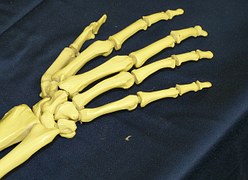Posted On: December 12, 2014

Image Caption:
Fractures associated with bone weakness and thinning (osteoporosis) occur most frequently in the wrist, spine and hip bones.
Androgen-deprivation therapy (ADT) is an effective and commonly prescribed treatment for prostate cancer. However, it may weaken a person’s bones, putting them at greater risk of fractures. In light of this, Canadian guidelines recommend that all men treated with ADT receive a bone mineral density test to identify those with weakened bones so that they can be prescribed a bisphosphonate, a drug that strengthens bones and reduces fractures.
Although these guidelines were established in 2006, TGHRI Senior Scientist Dr. Shabbir Alibhai found that few men receiving ADT are being prescribed a bisphosphonate, leaving them at higher risk of fractures. These findings were recently published in the prestigious Journal of the American Medical Association.
For this study, researchers examined the health records of 35,487 men over the age of 66 who started ADT between 1996 and 2012, and linked this information to prescription drug claims. They found that only ~ 3 out of every 100 men treated with ADT between 2010 and 2012 had been prescribed a bisphosphonate. Alarmingly, these numbers were only slightly higher for men who, prior to commencing ADT, had a history of bone weakness.
“There seems to be a clear mismatch between Canadian guidelines regarding bisphosphonate usage in men undergoing ADT and actual clinical practice”, says Dr. Alibhai.
This study was supported by the Toronto General & Western Hospital Research Foundation and the Toronto Rehabilitation Institute.
Bisphosphonate prescriptions in men with androgen deprivation therapy use. Gulamhusein H, Yun L, Cheung AM, Sutradhar R, Paszat L, Warde P, Alibhai SM. JAMA. 2014 Dec 3. [Pubmed Abstract]
Although these guidelines were established in 2006, TGHRI Senior Scientist Dr. Shabbir Alibhai found that few men receiving ADT are being prescribed a bisphosphonate, leaving them at higher risk of fractures. These findings were recently published in the prestigious Journal of the American Medical Association.
For this study, researchers examined the health records of 35,487 men over the age of 66 who started ADT between 1996 and 2012, and linked this information to prescription drug claims. They found that only ~ 3 out of every 100 men treated with ADT between 2010 and 2012 had been prescribed a bisphosphonate. Alarmingly, these numbers were only slightly higher for men who, prior to commencing ADT, had a history of bone weakness.
“There seems to be a clear mismatch between Canadian guidelines regarding bisphosphonate usage in men undergoing ADT and actual clinical practice”, says Dr. Alibhai.
This study was supported by the Toronto General & Western Hospital Research Foundation and the Toronto Rehabilitation Institute.
Bisphosphonate prescriptions in men with androgen deprivation therapy use. Gulamhusein H, Yun L, Cheung AM, Sutradhar R, Paszat L, Warde P, Alibhai SM. JAMA. 2014 Dec 3. [Pubmed Abstract]





Comments